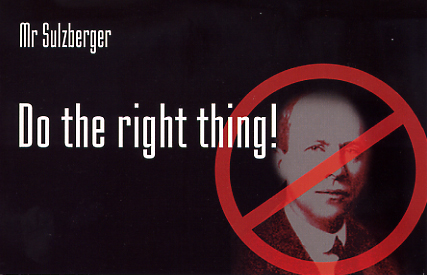 Mr. Arthur Sulzberger, Jr. Chairman & Publisher
Mr. Arthur Sulzberger, Jr. Chairman & Publisher
The New York Times
229 W 43rd St
NY 10036
Dear Mr. Suzberger,
While writing in the New York Times, Walter Duranty helped cover up the genocidal Great Famine of 1932-1933 in Soviet Ukraine. He lied for the Soviets before, during and after 1932-1933. Stalin's apologist did not merit a Pultizer Prize. Keeping Duranty's prize befouls The New York Times. Do the right thing. Return it to the Pulitzer Prize Committee.
Produced by the Ukrainian Canadian Civil Liberties Association.
2003 Campaign to rescind Pulitzer prize
An international protest was initiated by Ukrainian communities around the world --"Revoke Walter Duranty's 1932 Pulitzer Prize" -- to commemorate the 70th Anniversary of the Great Ukrainian Famine of 1932-33. Mr. Duranty publicly denied that there was a famine in Soviet Ukraine and adjacent territories, doing so in the pages of The New York Times while privately admitting, to Foreign Office officials at the British Embassy in Moscow that as many as 10 million people had perished, directly or indirectly, as a result of famine conditions in the USSR. Followup : PULITZER PRIZE BOARD Statement on Walter Duranty's 1932 Prize
After more than six months of study and deliberation, the Pulitzer Prize Board has decided it will not revoke the foreign reporting prize awarded in 1932 to Walter Duranty of The New York Times.
In recent months, much attention has been paid to Mr. Duranty's dispatches regarding the famine in the Soviet Union in 1932-1933, which have been criticized as gravely defective. However, a Pulitzer Prize for reporting is awarded not for the author's body of work or for the author's character but for the specific pieces entered in the competition.
Therefore, the Board focused its attention on the 13 articles that actually won the prize, articles written and published during 1931.
In its review of the 13 articles, the Board determined that Mr. Duranty's 1931 work, measured by today's standards for foreign reporting, falls seriously short. In that regard, the Board's view is similar to that of The New York Times itself and of some scholars who have examined his 1931 reports. However, the Board concluded that there was not clear and convincing evidence of deliberate deception, the relevant standard in this case. Revoking a prize 71 years after it was awarded under different circumstances, when all principals are dead and unable to respond, would be a momentous step and therefore would have to rise to that threshold.
The famine of 1932-1933 was horrific and has not received the international attention it deserves. By its decision, the Board in no way wishes to diminish the gravity of that loss. The Board extends its sympathy to Ukrainians and others in the United States and throughout the world who still mourn the suffering and deaths brought on by Josef Stalin.
Sig Gissler, administrator
Pulitzer Prizes
Graduate School of Journalism, Columbia University
2950 Broadway, New York, NY 10027
Phone: 212-854-7327; Fax: 212-854-3342
www.columbia.edu/~sg138
Those who wish to express their dissatisfaction, may contact Mr Gissler.
German victims Letters from the famine years Germans in the Soviet Union (Ukraine) write their American relatives 1925-1937
Genocides: "Compared to the number of people who are familiar with the Jewish holocaust, how many people heard of the Armenians genocide, for example, in which 1.5 million Armenians were allegedly systematically exterminated at the hands of the Ottoman Turks? How many people heard of the Algerians alleged 1 million martyrs during the 1950s bloody war of independence from France, or, even what could well be the 20th century's worst holocaust ever, Stalin's Red Holocaust in Eastern Europe in the 1930s and 40s where over 7 million Ukrainians, Poles, Lithuanians, Latvians and Estonians were murdered, starved to death, or died in Stalins death camps? Just to mention a few. Not quite enough people, I am sure. It is unfair to our children to teach them unrealistic or politically orchestrated history; it is also unfair to the (deceased) genocides victims or their existing descendents. Fairness and objectivity are the key, and that means curricular inclusiveness of the world's holocaustal accounts.
Regards, Baha Abushaqra (Mr.) "
Mideast Journal